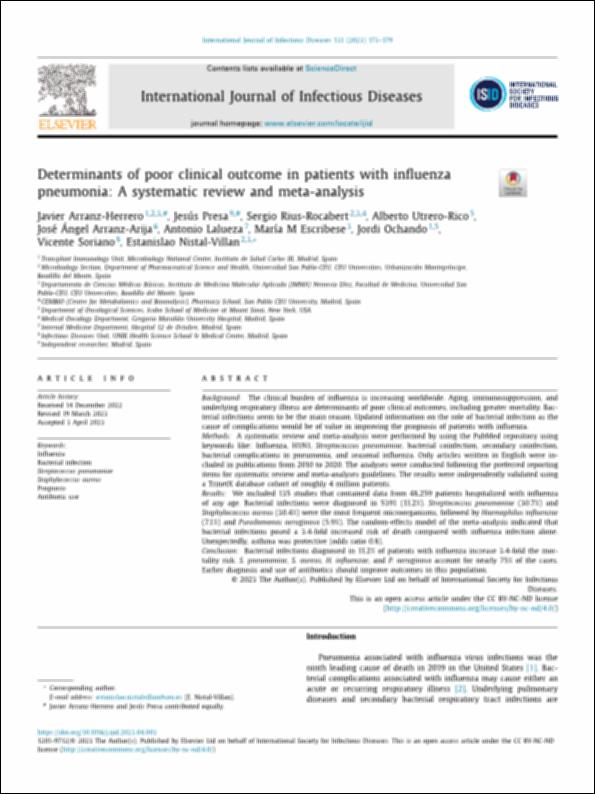Por favor, use este identificador para citar o enlazar este ítem:
http://hdl.handle.net/10637/15528Determinants of poor clinical outcome in patients with influenza pneumonia: A systematic review and meta-analysis
| Título : | Determinants of poor clinical outcome in patients with influenza pneumonia: A systematic review and meta-analysis |
| Autor : | Arranz Herrero, Javier Presa, Jesús Rius Rocabert, Sergio Utrero Rico, Alberto Arranza Arija, José Ángel Lalueza, Antonio Escribese Alonso, María Marta Ochando, Jordi Soriano Chirona, Vicente Nistal Villán, Estanislao |
| Materias: | Influenza Bacterial infection; Streptococcus pneumoniae; Staphylococcus aureus; Prognosis; Antibiotic use |
| Editorial : | Elsevier |
| Citación : | Javier Arranz-Herrero, Jesús Presa, Sergio Rius-Rocabert, Alberto Utrero-Rico, José Ángel Arranz-Arija, Antonio Lalueza, María M Escribese, Jordi Ochando, Vicente Soriano, Estanislao Nistal-Villan, Determinants of poor clinical outcome in patients with influenza pneumonia: A systematic review and meta-analysis, International Journal of Infectious Diseases, Volume 131, 2023, Pages 173-179, ISSN 1201-9712, https://doi.org/10.1016/j.ijid.2023.04.003 |
| Resumen : | Background: The clinical burden of influenza is increasing worldwide. Aging, immunosuppression, and underlying respiratory illness are determinants of poor clinical outcomes, including greater mortality. Bac- terial infections seem to be the main reason. Updated information on the role of bacterial infection as the cause of complications would be of value in improving the prognosis of patients with influenza. Methods: A systematic review and meta-analysis were performed by using the PubMed repository using keywords like: Influenza, H1N1, Streptococcus pneumoniae , bacterial coinfection, secondary coinfection, bacterial complications in pneumonia, and seasonal influenza. Only articles written in English were in- cluded in publications from 2010 to 2020. The analyses were conducted following the preferred reporting items for systematic review and meta-analyses guidelines. The results were independently validated using a TrinetX database cohort of roughly 4 million patients. Results: We included 135 studies that contained data from 48,259 patients hospitalized with influenza of any age. Bacterial infections were diagnosed in 5391 (11.2%). Streptococcus pneumoniae (30.7%) and Staphylococcus aureus (30.4%) were the most frequent microorganisms, followed by Haemophilus influenzae (7.1%) and Pseudomonas aeruginosa (5.9%). The random-effects model of the meta-analysis indicated that bacterial infections posed a 3.4-fold increased risk of death compared with influenza infection alone. Unexpectedly, asthma was protective (odds ratio 0.8). Conclusion: Bacterial infections diagnosed in 11.2% of patients with influenza increase 3.4-fold the mor- tality risk. S. pneumoniae, S. aureus, H. influenzae , and P. aeruginosa account for nearly 75% of the cases. Earlier diagnosis and use of antibiotics should improve outcomes in this population. |
| Descripción : | Supplementary material associated with this article can be found, in the online version, at doi: 10.1016/j.ijid.2023.04.003 |
| URI : | http://hdl.handle.net/10637/15528 |
| Derechos: | http://creativecommons.org/licenses/by-nc-nd/4.0/deed.es Open Access |
| ISSN : | 201-9712 |
| Fecha de publicación : | 23-abr-2023 |
| Centro : | Universidad San Pablo-CEU |
| Aparece en las colecciones: | Facultad de Farmacia |
Los ítems de DSpace están protegidos por copyright, con todos los derechos reservados, a menos que se indique lo contrario.


